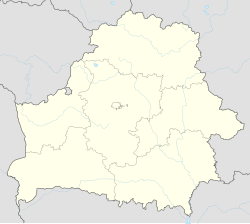Rechytsa
|
Rechytsa Belarusian: Рэчыца |
|||
|---|---|---|---|

Rechytsa town centre, Kastrychnitskaya (October) Square
|
|||
|
|||
| Coordinates: 52°21′50″N 30°23′41″E / 52.36389°N 30.39472°ECoordinates: 52°21′50″N 30°23′41″E / 52.36389°N 30.39472°E | |||
| Country |
|
||
| Region | Gomel Region | ||
| District | Rechytsa District | ||
| Founded | 1213 | ||
| Population (2010) | |||
| • Total | 64,731 | ||
| Time zone | EET (UTC+2) | ||
| • Summer (DST) | EEST (UTC+3) | ||
| Postal code | 247500 | ||
| Area code(s) | +375 2340 | ||
| License plate | 3 | ||
| Website | Official website (Russian) | ||
Rechytsa (Belarusian: Рэчыца, pronounced [ˈrɛtʂɨtsa]; Polish: Rzeczyca; Lithuanian: Rečyca) is a city in the Gomel Region of Belarus. It is center of Rechytsa District. The city is situated at the mouth of Rechytsa River, flowing into the Dnieper. As of 2005[update] the population was 65,532.
Rechytsa is one of the oldest towns of Belarus. First settlements in this region are dated back to the epoch of mesolite (9–5th centuries B.C.). Later on the area was inhabited by the Dregovichi tribe. The town was first mentioned in the Novgorod chronicle in 1213 as a town of the Chernihiv Principality. Rechytsa was also ruled by Kiev and Turaŭ Grand Dukes. At the time of Gediminas reign (1311–1341) the town was annexed to the Grand Duchy of Lithuania. Rečyca as well as Orsha, Shklow, Mogilev, Stary Bychaw and Rahachow formed a well-developed frontier defense system at the River Dniepr.
1392–1430 – the reign of Grand Duke Vytautas. He constructed a fortified castle with five towers in the area of the detinets (old Belarusian for the downtown) on the bank of the Dniepr. At that time the town had three fortification lines in the form of water trenches and ramparts with bastions. In the area between the fortress and the second fortification line there was a territory for rich mansions, Church of the Order of Friars Preachers and a trade square. The town inhabitants settled lived between the second and third fortification lines. The construction of the town had clear right-angled forms.
In 1561 the town was partially granted the Magdeburg rights.
...
Wikipedia



